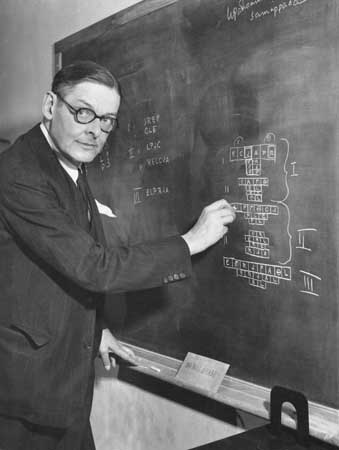
A rare fixed point in an ever-changing universe, every new issue of CADS is brimming with great stuff, and Number 62 makes no exception. Among the highlights is Curtis Evans's typically well-researched and insightful piece on T.S. Eliot's mystery criticism. Yes, that T.S. Eliot.
The fondness of the author of The Waste Land for detective stories is not exactly news. His enthusiastic endorsement of The Moonstone has graced many editions of the book. Neither is it very surprising. Detective stories were always popular with modernist writers from Bertolt Brecht and William Faulkner to Jorge Luis Borges and Gertrude Stein. Opposition mostly came (and still comes) from more conservative-minded people for whom the nineteenth century novel remained the impassable horizon of literature. What's really surprising, and extremely interesting, is the kind of detective fiction that appealed most to the future Nobel laureate.
While his defence of The Moonstone might lead one to believe Eliot favored those detective writers who aimed at literary significance, he was actually quite fond of "pure" puzzles, extolling the works of Agatha Christie, R. Austin Freeman, S.S. Van Dine and the "humdrums" J.J. Connington and Freeman Wills Crofts. So passionate was he about what John Dickson Carr would later call "The Grandest Game in the World" that he even deviced a set of rules for "good" detective fiction, predating those by Knox and Van Dine by some years. Authors who tried to "push the envelope" seem not to have been his cup of tea as his notable silence on Sayers suggest. This is not to say that Eliot didn't care at all for the "human element" but he realized that the combination of strong characterization and intricate plotting was a heavy task and a choice sometimes had to be made:
"Without dispraise of any individual writer we may be allowed to complain that modern detective fiction in general is weak in that it fails between two possible tasks. . . . It has neither the austerity, the pure intellectual pleasure of Poe's "Marie Roget", nor has it the fulness and abundance of life of Wilkie Collins. We often wish that the majority of our detective writers would concentrate on the detective interest, or take more trouble and space over the characters as human beings and the atmosphere in which they live."
Indeed.
If this made you want for more, I strongly suggest you ask for your copy of CADS to 9 Vicarage Hill, South Benfleet, Essex, SS7 1PA, United Kingdom. You won't be disappointed.
